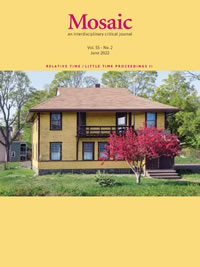Issue 55.2
Overview

Special Issue: Relative Time/Little Time II
Published: June 2022
View the issue introduction or see the issue summary and contents below.
11 essays, totalling 192 pages
$24.95 CAD
This is the second of two special issues featuring the proceedings of the online conference Relative Time/Little Time, developed in collaboration with the Dutch artist duo Bik Van der Pol.
The Japanese HouseAndrea Robbins and Max Becher Photographs taken by Andrea Robbins and Max Becher of Bunkio Matsuki’s house in Salem, Massachusetts. | |
The Matsuki Con-structionAndrea Robbins and Max Becher This essay focuses on a house built in 1894 in Salem, Massachusetts, the disparities between descriptions of it versus its actual appearance, and the unruly entries in archives and the public record planted by its original owner, Bunkio Matsuki. | |
Observational Eros: Time, Libido, the Attention Ecology, and SurfingDominic Pettman In her popular book How To Do Nothing, Jenny Odell briefly introduces the prospect of “observational eros.” This essay borrows this suggestive prompt to explore the compromised contemporary relationship between desire and attention. There follows a portrait of the surfer as a specific instance of participating eros; one that complements the observational. | |
A Q&A with Dominic PettmanDominic Pettman The following exchange took place during the Question and Answer period of Dominic Pettman’s (DP) talk, “The Observational Eros: Time, Libido, and the Attention Ecology.” The talk was given digitally on 3 February 2022 as part of Relative Time/Little Time, a speaker series designed collaboratively by Dutch artist duo Bik Van der Pol (LB and JVdP) and Mosaic. The Question and Answer session was moderated by Mosaic editor Shepherd Steiner (SS). | |
‘A Great Universal Future Equitably Open to All Peoples, All Nations, and All Species’: Decolonization Beyond OpennessChigbo Arthur Anyaduba This essay reflects on a cosmopolitan vision of openness emerging in a growing discourse on decolonization in Africa and other parts of the world. I argue that this idea of openness often masks its limitation in envisioning and conceptualizing decolonization beyond the established historical and epistemic frameworks of Western colonialism. | |
A Q&A with Chigbo Arthur AnyadubaChigbo Arthur Anyaduba The following exchange took place during the Question and Answer period of Chigbo Arthur Anyaduba’s (CAA) talk, “‘A Great Universal Future Equitably Open to All Peoples, All Nations, and All Species’: Decoloniality Beyond Openness.” The talk was given digitally on 5 February 2022 as part of Relative Time/Little Time, a speaker series designed collaboratively by Dutch artist duo Bik Van der Pol and Mosaic. The Question and Answer session was moderated by Mosaic editor Shepherd Steiner (SS). | |
How Indigenous and Settler Time Shape Interdisciplinary ResearchMelanie Braith This essay analyzes understandings of time in the context of Indigenous resurgence and decolonization, specifically in the context of the asiniskaw īthiniwak (Rocky Cree) in Manitoba, Canada. In order to do so, it focuses on the Six Seasons of the Asiniskaw Īthiniwak: Reclamation, Regeneration, Resurgence project as a case study. | |
A Q&A with Melanie BraithMelanie Braith The following exchange took place during the Question and Answer period of Melanie Braith’s (MB) talk, “Learning from the Six Seasons: Research with the Asiniskaw Īthiniwak.” The talk was given digitally on 5 February 2022 as part of Relative Time/Little Time, a speaker series designed collaboratively by Dutch artist duo Bik Van der Pol and Mosaic. The Question and Answer session was moderated by Mosaic editor Shepherd Steiner (SS). | |
Towards an Anthropology of AstonishmentSean Singh Matharoo This essay synthesizes shared features of the philosophies of Jacques Derrida, Claude Lévi-Strauss, Denise Ferreira da Silva, and Eleanor Kaufman through Cartesian astonishment. I demonstrate that this synthesis may lead to the cultivation of an ethico-political structuralist anthropology that finds its energy in an abstraction coinciding with the act of reading literature. | |
A Q&A with Sean Singh MatharooSean Singh Matharoo The following exchange took place during the Question and Answer period following Sean Singh Matharoo’s (SSM) talk, “An Artificial Anthropology of Noise.” The talk was given digitally on 5 February 2022 as part of Relative Time/Little Time, a speaker series designed collaboratively by Dutch artist duo Bik Van der Pol (LB and JVdP) and Mosaic. The Question and Answer session was moderated by Mosaic Editor Shepherd Steiner (SS). | |
Goose poemsMelanie Dennis Unrau “Goose” is a series of hand-traced poems made using found text and images by “father of the tar sands” S.C. Ells (1878-1971), whose work for the Canadian Mines Department from 1913 to 1945 focused on developing a tar-sands industry in northern Alberta. |